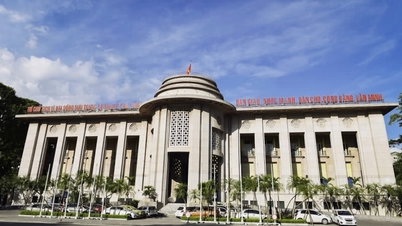For the first time, the concept of KPI - a performance evaluation index familiar to businesses - is included in the draft as a basis for evaluating civil servants. Not just general criteria, the draft aims to quantify the volume, quality, progress, and even the level of satisfaction of people and organizations with each public service position.
 |
| Staff of Tuy Hoa Ward Public Administration Service Center handle administrative procedures for people. Illustration photo: Viet An |
This is clearly a breakthrough step. Because up to now, the work of evaluating civil servants has been mainly based on reports and comments from the collective or direct superiors. The emotional factor is inevitable, leading to a situation of being too lenient, making peace as precious as possible, and everyone completing their tasks well. Therefore, applying KPI will ensure democracy, publicity, fairness, accuracy, transparency, and objectivity. When each civil servant proves the effectiveness of their work with specific data, those who do well will be recognized and rewarded; those who are stagnant and dependent will have to make efforts or give way to others. This is the spirit of taking the results of serving the people as a measure of performance.
However, to prevent KPIs from becoming a slogan or a formal burden, we need to look directly at the challenges. First of all, KPIs must be designed to fit the specifics of each position. A tax officer, a policy developer or a communal land official cannot apply the same measuring stick. If targets are set too high, beyond the capacity of resources, it is easy to lead to chasing after achievements. On the contrary, if targets are vague and easy, KPIs will lose their filtering meaning.
In addition, data for measurement is also a matter of concern. KPIs are only truly objective when there is a transparent, updated, and verifiable data system. In the context that many agencies still manage paper records and have not yet connected data, collecting and verifying information to score civil servants is a big challenge. Without synchronous digital transformation and procedural reform, KPIs can easily be manipulated or turned into "talking numbers" according to subjective opinions.
Another barrier is the fear of change. The habit of general, emotional evaluation has existed for many years, and introducing "hard" indicators will certainly encounter resistance from a group of civil servants. At this time, the pioneering efforts of the presiding agency, the determination of the management level and especially the consensus of society will determine the success or failure of the policy.
In practice, industries and localities that have boldly applied KPI have recorded positive results: increasing personal responsibility, reducing cumbersome procedures, and increasing the satisfaction of people and businesses. Once civil servants understand that work results are linked to their promotion path and their own interests, they will naturally change.
Moving from emotional to quantitative is never easy. But if we want a professional, transparent, and effective public service, we have no choice but to step out of our comfort zone. KPI is not a magic wand, but it is a necessary tool to help us move closer to a modern administration - where each civil servant is evaluated for their capacity, contribution, and social expectations.
Source: https://baodaklak.vn/xa-hoi/202510/mo-duong-cho-nen-cong-vu-chuyen-nghiep-24c1632/


![[Photo] Solemn opening of the 1st Government Party Congress](https://vphoto.vietnam.vn/thumb/1200x675/vietnam/resource/IMAGE/2025/10/13/1760337945186_ndo_br_img-0787-jpg.webp)














































































































Comment (0)